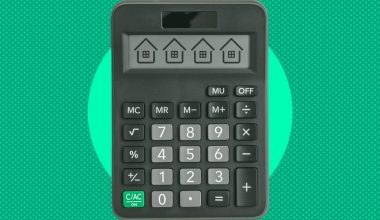A mortgage amortization calculator is a very useful tool that helps you to determine the cost of a long-term fixed-rate mortgage.
This is because, it helps you to conveniently determine the principal you’d be required to pay each month, as well as to know how your loan payment is structured.
More so, if you’ve ever wondered what part of your monthly mortgage payment goes to interest and principal, then a mortgage amortization calculator is the tool for you.
Find out how to use this tool for your benefit, as well as to know how quickly you’d be able to pay off your mortgage loan as you read this article.
But first, let’s get started with the basics.
What is Mortgage Calculator Amortization?
A mortgage amortization calculator is used in understanding the cost of a long-term fixed-rate mortgage because it shows you the principal you’ll pay throughout the life of the loan.
In addition, it helps you to understand the structure of your mortgage payments. it shows you the percentage of your monthly mortgage payments that’ll go towards interest and principal.
Furthermore, when you amortize a loan, you pay it off by making gradual payments of interest and principal. A self-amortizing loan will be fully paid off when you make the final periodic payment.
Your period payments are your monthly principal and interest payments. Each payment monthly will be the same. However, the amount that goes for interest will gradually decrease each month, while the amount that goes for principal will gradually increase monthly.
READ ALSO: Mortgage Calculator Refinance Guide: Overview, Comparisons, & All you need
What is an Amortization Schedule?
A mortgage amortization schedule is a table that shows the regular payment on a mortgage over time. A part of the mortgage payment goes toward the principal and interest, and the amortization schedule shows which part goes for which component of your mortgage.
Usually, most of the payment is used for your interest rather than the principal. The mortgage amortization schedule will show a larger payment of our payment goes towards paying the principal until you make the last payment throughout your loan term.
READ ALSO: How To Become A Mortgage Broker: A Comprehensive Guide for US Citizens (+ Free Tips)
How Do You Calculate Amortization?
You can calculate your loan amortization using a mortgage amortization calculator. The calculator shows;
- How much principal and interest are paid in any payment.
- The amount of principal you owe on the mortgage at a particular date.
- How much time you will reduce the end of the mortgage by making a few extra payments.
- How much total principal and interest have been paid at a particular date.
This means that you can use the mortgage amortization calculator to;
- See how much interest you have paid over the life of the mortgage, or during a particular year, though this may vary based on when the lender receives your payments.
- Determine how much principal you owe now, or will owe at a future date.
- Know how much extra you would need to pay every month to repay the mortgage in, say, 15 years instead of 20 years.
- Determine how much equity you have.
Here’s a formula to calculate an amortization schedule on your own
To calculate a loan amortization schedule, you’d need to use the loan amount, loan term, and interest rate.
With these, you can use Excel’s PMT function to calculate your monthly payment. For example, let’s say the principal amount of your loan is $500,000 with an interest of $100,000 at a rate of 5%. Using the PMT function in excel, you’d enter =PMT (5%/100,000,50000).
Once your know what your mortgage monthly payment is, you can now calculate how much you pay for both principal and interest using the formula below from Investopedia.
Principal Payment = Total Monthly Payment – [Outstanding Loan Balance x (Interest Rate/12 Months)]
Use this formula to calculate your amortization table for your loan term. It makes the work a lot easier.
READ ALSO: Mortgage Brokers: How do Mortgage Brokers Make Money in the US (Updated)
How to Calculate Amortization with Extra Cost
Oftentimes, people decide to pay their loans faster to save money on interest. Even with low interest, you may decide to pay extra to enable you to pay off your loan very quickly.
So, if you want to add $50 to every monthly payment, then you can use the formula above to calculate a new amortization schedule to see how quickly you’d pay off your loan and how much less interest you’d owe.
Generally, mortgage loans are not the only type of loans you amortize. Other loans such as home equity loans, student loans, auto loans, and personal loans can be amortized. They usually have a fixed monthly payment amount and a scheduled payoff date.
Conversely, there are some loans that do not amortize. According to Investopedia, If you can reborrow money after you pay it back and you don’t have to pay your balance in full by a particular date, then you have a non-amortizing loan. Examples of such loans are credit card loans.
READ ALSO: Secondary Mortgage Market: Step By Step Guide On How It Works
How Can an Amortization Calculator Help?
An amortization calculator makes it easy for you to know your monthly mortgage payments. As well know what specific amount goes towards principal and interest each month.
Generally, an amortization calculator helps you to;
- Know how much interest you’ve paid on your loan so far.
- See how much principal you will owe at any future date during your loan term.
- Determine how much equity you should have, if you’re not sure of your monthly loan statement.
- See how much interest you’ll pay over the entire term of a loan, and show you the impact of choosing a longer or shorter loan term or getting a higher or lower interest rate.
- Know much interest you’ll pay if you keep the loan until the end of its term .
READ ALSO: Zillow Mortgage Calculator: How Accurate is Zillow Mortgage Calculator? (+ Quick Tips)
How much is a 200k mortgage per month UK?
What is the monthly payment for a mortgage of £200,000? There is no fixed price for a mortgage of this magnitude, but as a general illustration, the monthly payments for a typical capital and repayment mortgage would be £948 over a 25-year period at a 3% interest rate.
What is the monthly payment on a $600000 mortgage?
A 30-year fixed-rate loan would cost $3417 a month with a 5% down payment ($30,000) and a 6% interest rate, without taxes and insurance. It would be $4809 for a 15-year loan with a fixed rate.
How much is a 300 000 mortgage A month UK?
What is the monthly payment for a mortgage of £300,000? You might anticipate paying about £1,346 per month based on a typical repayment mortgage with a term length of 25 years and an average interest rate of 2.5%.
What is the monthly mortgage on a $700000?
Your monthly mortgage payment on a 30-year $700,000 loan may be $4,657.12 at a fixed interest rate of 7.00%, while a 15-year mortgage could cost $6,291.80.
What salary do I need to afford a 300K house UK?
Generally speaking, you can borrow four to five times your annual salary. Accordingly, you would have to make between £60,000 and £75,000 per year in order to qualify for a mortgage of $300,000.
How much is a 30k mortgage per month UK?
A mortgage of this size does not have a fixed monthly payment because the repayment is determined by the secured interest rate and the loan’s term. For a 25-year regular repayment mortgage, your payments would be £142.26 per month based on a 3% interest rate.
Bottom Line
An amortization calculator makes the work easier. It is a more convenient way to see the effect of different loan options.
By changing the loan terms, you can see how much you’d be required to pay every month, as well as how much of each payment will go towards principal and interest.
The better part, an amortization calculator works with any type of amortized loan.
I hope this article explains what a mortgage amortization loan really means. If you have any questions or suggestions, leave them in the comments section.
All the best!
Recommendations
- Manual Underwriting Process for Mortgages, FHA & VA Loans
- Deed Of Trust: Overview, Mortgage vs. Deed of Trust & How it Works
- Mortgage: Simple 2021 Guide for Beginners and all you need Updated!!!
- Best mortgage lenders: 2021 picks updated (+ detailed guide)
- Mortgage Underwriter: Process, Salary, Jobs & How To Become a M.U Guide.
References






